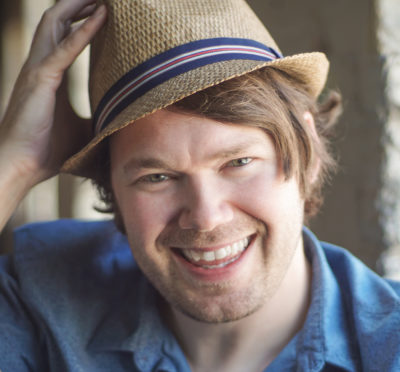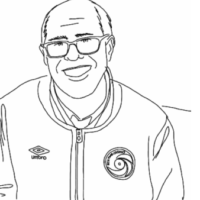How do I book a college tour?
Mark Miller is the founder and creative director of Brave Enough Artist Agency, a company that helps develop artists as they navigate the music and entertainment industries. Before launching Brave Enough, Mark was an artist, touring three continents, 48 states and over 100 colleges and universities both solo as theothermarkmiller and as part of the indie pop duo So Long Solo. Mark was elected to the NACA Mid American Regional Planning Committee in 2016 and currently serves as the Mid America Associate Member Liason.

Mark talked about the current college music market. He also shared some tips about how to break into this space and the realities of putting together successful college tours.
MC:
Thanks so much for taking the time to speak today. Tell me a bit about your company / what the mission statement is?
MM:
Absolutely! Happy to share information about all of this. I started Brave Enough Artist Agency after spending a decade as a musician, where I was always feeling like I had to blaze the trail. Those joyful challenges proved to be a case study of how to go from earning (and living off of) $10,000 a year to building a music career where we broke six figures in our final year, and also learning how to navigate personal lives, success, and disappointment. Moving from being a touring performer out on the road 8 or more months out of 12 to building an artist agency full time really felt like a divine and yet natural change. Our goal at the agency is to walk with our artists through the sunset of their careers, building a sustainable, healthy, and fulfilling career in music. We have several core values at Brave Enough, but if you could sum them all up it would be to serve everyone the way we would want to be served and with caring intent – the person is always more important than the business.
MC:
How did you go about putting this company together?
MM:
I essentially took the business that my wife and I had built as an Indie/Pop duo (So Long Solo) and scaled it. We definitely weren’t the most talented musicians in the market, but we learned from a lot of brilliant people on how to run an effective and creative business, so we just took the same principles and applied them to artists with a lot more talent than us. I reached out to our fellow artists who I believed in and thought they would be successful in the college market and they were our foundation.
MC:
What are the differences between the Campus activities organizations NACA and APCA?
MM:
Let me start by saying that each organization has a lot of value and benefits, and we are proud to be part of both.
I’ve made a chart to help break this down a bit. These numbers change and aren’t always easily accessible, but should be pretty close and give you the overall feel of the two organizations. You can also learn more at www.naca.org and www.apca.com.
| NACA | APCA |
| # of school members | 924 | Approximately 300 |
| # of schools at National Convention | Approximately 365 | Approximately 100 |
| # of onsite bookings at National Convention | 875 | 633 |
| School Budget Size | Small to Huge – In addition to booking $1k-2k coffee house shows, many NACA schools will spend 5 figures on one or more large concerts, and also spend $2k-5k on speakers and comedy regularly. | Mostly smaller budgets. Nearly all shows booked at APCA are in the $1k-2k range, but they are very active in that range and book a lot by comparison. |
| Institution Type | All – community colleges and private schools to huge state universities | Mostly community colleges and technical institutions |
| Atmosphere | Professional | Informal |
| Tax Status | Non-Profit | For Profit |
| # of conferences | 9
-National Convention -South Regional Conference -Mid Atlantic Regional Conference -Mid Atlantic Festival -Central Regional Conference -Mid America Regional Conference -Northeast Regional Conference -West Regional Conference -Northern Plains Regional Conference
|
5
-National Convention -South Central Regional Conference -Northeast Regional Conference -Midwest Regional Conference -Hershey Regional Conference |
| Costs to Participate – Self Represented | Approximately $1,000/conference | Approximately $2,000/conference |
| Membership | $647 | $299 |
| Full Conference Registration | $214-239 per person | $249 per person |
| Booth Fee | $290 | $639 |
| Showcase Submission Fee | $95 | $0 |
| Showcase Fee | $115-300 | $899-$999 |
| Difficulty level of getting a showcase | Hard – each conference may have 400 submissions (most of them quality) with only around 50 being selected to showcase. All of the showcases are chosen by a regional committee that essentially locks themselves in room for 3-4 days and votes on which acts get to showcase based on a number of criteria including talent, diversity, and representation. | Easy – APCA is very accommodating as long as they believe the talent is relevant. You essentially contact APCA and send them your videos, and they quickly say yes or no and pick a showcase slot for you. |
| Costs to Participate – Agency Represented | Approximately $400/conference | Approximately $1,500/conference |
| Membership | $0 | $0 |
| Full Conference Registration | $0 (optional $54 day pass if you attend on days you aren’t showcasing) | $0 (optional $40 day pass if you attend on days you aren’t showcasing) |
| Booth Fee | $0 | $439-639 |
| Showcase Submission Fee | $95 | $0 |
| Showcase Fee | $115-300 | $899-$999 |
And I have a few other thoughts about this too. In terms of showcasing, I personally love the fact that I get to choose my acts for APCA. While the NACA selection process (almost) ensures that all of the showcases are top notch acts, it frequently misses on acts that I think should be in. APCA gives me more control over my roster and choosing opportunities for my artists. If you can land NACA showcases, however, it’s less expensive, higher production level, and in front of more buyers. A lot of my artists do a hybrid of both.
Also, block booking/cooperative buying is at the cornerstone of each organization. Essentially, schools meet up each day of the conference to discuss which acts they want to book from the conference and try to route the artist to save money (and give the artist better routing). What that looks like to a typical new singer songwriter may be something like this:
Single Date: $1,000 + SLMRT (Sound Lights Meal Room Travel)
2 of 3: $950 + SLMRT ( 2 of 3 is only used in APCA officially)
3 of 5: $900 + SLMR
5 of 7: $800 + SLMR
2 of 3 means that 2 schools within a reasonable driving distance (4 hours) agree to book the same act within a 3 day period. 3 of 5 is 3 schools in 5 days, etc.
NACA has a much more organized Block Booking process that’s integrated with an online platform that schools and agents/artists can use throughout the year. It’s WAY easier to keep track of everything and have it quickly organized with possible dates, mapping distances, and contact information. I may be biased though since I helped plan the NACA 24/7 booking platform.
The APCA co-op session feels pretty chaotic and hard to follow, yet somehow the schools make it work. It’s exciting, but confusing and hard to keep track of. One thing I love about APCA co-op is that they have a school head of each region who organizes the bookings, so it helps the lack of an online system. As an example at the last APCA Nationals – one of of the regional directors worked with the schools for three of my acts and basically came to me and said ok, here are the 5 dates where we want each of these 3 performers. And then he would take my requests back to those schools and work it all out. Amazing. NACA handles that fairly well in the block booking meeting with one overhead coordinator, but I don’t feel like the schools take as much ownership on working out the blocks – more falls onto the shoulders of the agent.
And when it comes to atmosphere, I started in NACA, and that’s where we built our career. I’ve been with a lot of the folks in NACA for three months of my life every year since 2011, so it feels like a family to me. Yet, I do have to remember that it took a few conferences to really feel accepted. And I get it. There’s a pretty high turnover rate of new associates, as it can be a tricky market to navigate and take a couple of years to really build your network. There are lots of resources now to help, including the Associate Advisory Group (AAG) which I’m a part of, and the NACA office staff is always very welcoming and quick to help, but it still is pretty difficult to navigate the first time. NACA is working on this, but I would never recommend to someone to go to one NACA to “try it out.” I would say come to NACA, definitely, but have a 2-3 year plan with at least 3 of the same conferences each year (as self-repped – being on an agency is different).
I would also say that NACA tends to live more by the letter of the law, where APCA tends to be more of rules being “guidelines” that help make decisions but often willing to make exceptions where logic and relationship dictates.
NACA is a lot larger, and has a more general professional, organized feel. APCA feels more like a family atmosphere of “we’re all in this together” and much like a family, can feel less organized/planned at times.
Both organization are great to be a part of!
MC:
Is it absolutely essential to have a college booking agent to perform at one of these showcases and be taken seriously?
MM:
No. We did it, but I feel like we were certainly an outlier. Most self-repped artists who are able to find success end up joining an agency, with just a literal handful of artists choosing to stay self-represented. Being your own agent in the college world is A LOT OF WORK … and a lot of money. We spent probably 90% of our time doing the work of an agent, and 10% of our time doing the work of an artist. So if you’re going self-represented, be prepared to work hard and have funding in place to keep you rolling for a couple of years. By going to all 7 NACA regional conferences our first year we were able to break even on our NACA expenses (though we lived like nomads using www.couchsurfing.com), but for our day to day expenses and other artists expenses we were mostly living off of savings. But again, we weren’t as talented as a lot of our artists are, which made it somewhat of an uphill battle.
If you’re on an agency, you’re much more likely to get a great jump start into NACA, from landing a showcase, to showcasing well (it’s VERY different from an actual performance), to booking shows. It’s also SIGNIFICANTLY more affordable on the investment side.
Still, it can be pretty hard getting an agency to look at you, much less sign you – so going self-repped and finding success can be a great way to get signed.
MC:
I’m told that there can be a bit of a rut that artists who do the college circuit can get into and that being an artist performing exclusively at colleges might not garner an act the kind of attention that turns into paid tickets in a club setting. Is there any truth to this?
MM:
Andy Grammer, Matt Nathanson, Zac Brown Band, Simon and Garfunkel, Vince Gill, Kenny Rogers, Howie Day, Plain White T’s, Kris Allen… I could go on and on and on, not even touching comedians from Carrot Top to Jay Leno. ALL of those artists and many, many more did NACA at some point. So, I don’t think there’s any truth to the college market damaging a career.
Now, what definitely does happen is artists get comfortable and don’t look to the future. Once you’re making a decent income, it’s really important to keep blocking off time in your calendar to create new content, plan your next releases, and think about your next steps.
I’ve known of several acts who use college shows as anchor dates to pay the bills, but then book other venue shows that are career-building but not immediately fiscally beneficial around them. I think that’s a really smart move for artists seeking to build a long-term touring career. If you build up a fan-base well, your college shows might also change from the coffeehouse gigs to ticketed theater or arena shows over time.
Something else that is often overlooked in the first few years of a touring career is rest. Or the lack there-of. While you need to work hard, you’ll work better if you plan periods of rest to stay healthy and focus on what’s important in your life (not related to music). I encourage my artists to block off 1 day every seven, and a complete week every month (or if you are out solid for 4-6 weeks, take 2 weeks off of touring after that).
Almost all acts will age out of the college market unless they adapt continually, or build a large fan base and keep releasing compelling content that keeps them relevant to the college demographic.
MC:
Are there certain kinds of acts that do better on the college circuit than others?
MM:
You’ll probably get different answers based on who you ask, but here are some of the things that I believe are important to find success here:
- You have to be friendly and easy-going. Divas will not last.
- Strong vocals. So many people are coming off The Voice or American Idol, or AGT, so that’s what you’re getting compared to during the showcase. It’s such a short window (10 minutes) to impress, and what I’ve seen is that showcasing quality vocals goes a long way.
- Relevant Covers. You can do songs in a lot of different ways, but you HAVE to embrace popular songs as part of your set and definitely as part of your showcase. I say that at least one, hopefully more, of the songs in your showcase has at least 100,000,000 million views on YouTube. The big question is, can the average (not hip/music loving), but the average 18-22 year old sing every word to this song?
- As long as you pay heed to the relevant covers rule, I think almost any genre can find a spot in the college market. NACA especially places a high value on diversity, unique instrumentation in pop settings for example, and also racial and social diversity.
- Keep it clean. In particular, swearing on stage or offending certain demographics is good way to get crossed off a school’s booking list.
- Small group size. There are more opportunities for solo and duo acts since many of the colleges venues are in more intimate places or near classrooms, though bands definitely find success as well. Schools are seldom willing to pay more for a band than a solo act, so that’s something to be aware of.
MC:
What is the most important piece of information you wish you had when you started out as a musician playing college shows?
MM:
Drop the “I’m an amazing songwriter” ego. Play at least 40% covers and people will have more capacity to take in your original music and you’re more likely to be brought back.
Video content is king.
Have a business plan, and recognize that you’ll have some months of large income and some months of no income, so plan accordingly.
MC:
Any general advice for an artist looking to break into this market?
MM:
Be prepared before entering. Most artists who contact me about joining my roster just aren’t ready yet. They might be in a year or two, but not yet.
Compare your live show and online content to NACA showcasing acts from a large NACA agency such as mine or Degy, etc. and see how you stack up since that’s what you are competing against for showcase slots and bookings. You don’t need a million followers, but you do need a live show that could get you a million followers if they only had the chance to see you. Your friends are not your litmus test. Most good friends will be ever encouraging and believe you can be the next Coldplay or Ed Sheeran. Even though it’s difficult, try to get the opinion from someone with success in the music industry. Hint, if you aren’t getting responses after reaching out to several agents, you probably aren’t ready yet – keep working on your craft!
As I said before, video content is king. If you don’t have great videos (especially live performances, though music videos are good as well), get them before you invest in the college market.
Plan, plan, plan … then execute. The most successful musicians I know weren’t born with the best talent, they are just the ones that showed up to work every day and loved it.
For more information about Mark and the work he does with artists, check out the Brave Enough Artist Agency website – https://www.braveenough.com/









